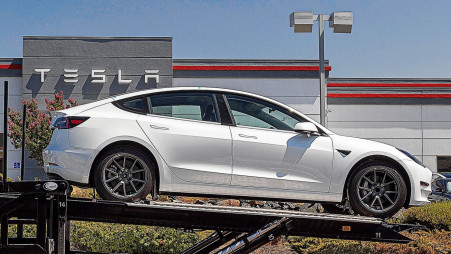Electric cars are shifting the center of the auto universe
EV’s are giving the South and Southwest a one-time chance to wrest control of US automobile industry from Midwest

One of the biggest economic development arms races in decades is beginning to take shape. A flurry of multi-billion dollar investment decisions from major automakers has combined with growth in consumer sales to make 2021 feel like the inflection point for electric vehicle adoption. And while automakers and governments are setting targets for EV's future market share — as much as 50% of all new vehicles sold in the U.S. in 2030 — where all of these vehicles will be produced remains an open question. For states in the Southeast and Southwest, it's an opportunity to wrest control of the automobile industry from its historical home in the Midwest.
As electric vehicles have scraped up a few percent of market share, Tesla Inc.'s model has set the course: retrofit an old automobile production facility (Tesla's facility in Fremont, California, was originally owned by General Motors Co.) and focus on perfecting a handful of innovative products until you've got something consumers want to buy. Rivian Automotive Inc., which is producing electric trucks out of an old Mitsubishi Corp. facility in Normal, Illinois, has used a similar approach.
But there's a difference between producing and selling a couple hundred thousand units a year and producing and selling up to 10 million units a year, which is the goal in 2030.
It's this next phase of expansion that's underway now. And what we're seeing is that the new plans being announced look different than what's come before. Tesla led the way with its battery-producing Gigafactory near Reno, Nevada, and its production facility that's under construction near Austin, Texas. Once again, its competitors appear to be following suit.
The big recent announcement rippling through the industry is the partnership between Ford Motor Co. and South Korea's SK Innovation Inc. to build $11.4 billion worth of battery and vehicle assembly plants in Kentucky and Tennessee, the biggest investment in Ford's history. If automakers expect to meet projected EV demand in 2025 or 2026, they have to move now so that they have time to build out the capacity they'll need down the road. These decisions essentially lock automakers into an electric future; as my Bloomberg colleague Nathaniel Bullard has put it, capital spending is destiny.
For cities and states hoping to win these facility announcements, a framework for success is starting to come together.
First, provide a massive, shovel-ready industrial site near major highways — the two Tesla facilities in Nevada and Texas are between 2,500 and 3,000 acres, or almost one-fifth of the size of Manhattan. Ford's planned facility outside of Memphis will be even bigger, almost 3,600 acres.
Second, gin up a boatload of financial incentives. Tennessee offered a whopping $500 million in tax breaks to lure Ford and SK — the final amount to be based on the number of jobs created. Tennessee is a particularly interesting case study because of the presence of electric utility Tennessee Valley Authority, which anted up incentives and power upgrades of its own. Battery factories use five times more electricity than typical assembly plants, making the ability to offer cheap, reliable power to industrial users a competitive advantage.
Part of state leaders' thinking about incentives is that it's a once-in-a-lifetime chance for the state to become to electric vehicles what Michigan has been to gasoline-powered vehicles: a production hub that creates tens of thousands of middle-class jobs, which then leads to a secondary wave of growth as supply chains get built nearby. The big auto companies have leverage, and are able to pit Nevada, Arizona, Texas, Kentucky, Tennessee, Georgia, and South Carolina against each other to crank up the benefits.
Another factor in the arms race is whether states have unionized labor or not. Automakers in the past have set up shop in right-to-work states like Alabama and South Carolina to avoid having to deal with unions. What's unique about the electric vehicle transition is the opportunity to shift the vast majority of production from union to non-union states over a short period of time. And it raises the question of whether the economic vision of President Joe Biden — a green economy renaissance in the Midwest powered by union workers — will crash into the hard reality that Southern states can offer incentives that Midwestern ones can't.
Large shovel-ready plots of land near highways, cheap and reliable electricity, hundreds of millions of dollars in tax incentives, and perhaps non-unionized labor; states that can offer all of the above are looking like the winners in an EV world. Those that can't should be asking what that means for their own futures
Conor Sen is a Bloomberg Opinion columnist and the founder of Peachtree Creek Investments. He's been a contributor to the Atlantic and Business Insider and resides in Atlanta.
Disclaimer: This article first appeared on Bloomberg, and is published by special syndication arrangement.



 Keep updated, follow The Business Standard's Google news channel
Keep updated, follow The Business Standard's Google news channel
















